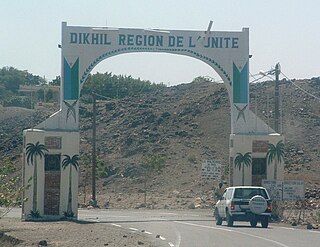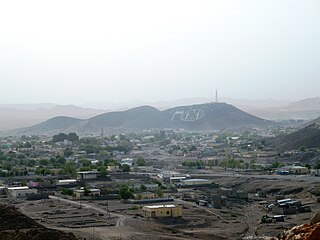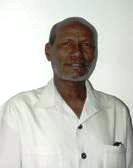Related Research Articles
Djibouti is a country in the Horn of Africa bordered by Somalia to the east, Eritrea to west and the Red Sea to the north, Ethiopia to the west and south, and the Gulf of Aden to the east.

Politics of Djibouti takes place in a framework of a presidential representative democratic republic, whereby the executive power is exercised by the President and the Government. Legislative power is vested in both the Government and the National Assembly. The party system and legislature are dominated by the socialist People's Rally for Progress. In April 2010, a new constitutional amendment was approved. The President serves as both the head of state and head of government, and is directly elected for single six-year term. Government is headed by the President, who appoints the Prime Minister and the Council of Ministers on the proposal of the latter. There is also a 65-member chamber of deputies, where representatives are popularly elected for terms of five years. Administratively, the country is divided into five regions and one city, with eleven additional sub-prefecture subdivisions. Djibouti is also part of various international organisations, including the United Nations and Arab League.

Ismaïl Omar Guellé is a Djiboutian politician who has served as the President of Djibouti since 1999, making him one of the longest-serving rulers in Africa. He is often referred to by his initials, IOG.

The French Territory of the Afars and the Issas was the name given to present-day Djibouti between 1967 and 1977, while it was still an overseas territory of France. The area was formerly known as French Somaliland. Its name derives from the Afar people of Djibouti and the Somali Issa clan.

Hassan Gouled Aptidon was the first President of Djibouti from 1977 to 1999.

Ahmed Dini Ahmed was a Djiboutian politician who served as the second Prime Minister of Djibouti. He was trained as a health technician and entered the political realm at age 26.

Dikhil is a town in the western Dikhil Region of Djibouti. Lying east of Lake Abbe, It is situated about 122 km (76 mi) southwest of Djibouti City and 12 km (7.5 mi) north of the border with Ethiopia. It serves as the administrative centre of the Dikhil Region, and is home to the Afar and Somali ethnic groups. The town develops gardens and fruit trees.

The National Assembly, formerly known as the Chamber of Deputies, is the unicameral legislative branch of the government of Djibouti.

Ali Sabieh is the second largest city in Djibouti. It is situated about 98 kilometres Southwest of Djibouti City and 10 km (6 mi) north of the border with Ethiopia. It sprawls on a wide basin surrounded by granitic mountains on all sides. Ali Sabieh's mild climate makes it a popular tourist destination for Djiboutians. The famous landmark of Ali Sabieh mountain is located near the city.

Aden Robleh Awaleh (1941 – 31 October 2014) was a Djiboutian politician and President of the National Democratic Party (PND). He was a member of the National Assembly of Djibouti.

The Djiboutians are the native inhabitants of Djibouti, as well as the global diaspora of Djibouti. The country is mainly composed of two ethnic groups, the Somali and the Afar. It has many languages - though Somali and Afar are the most widely spoken ones, Arabic and French serve as the official languages. There is a small Djiboutian diaspora in North America, Europe, and Australia.

The Front for the Liberation of the Somali Coast was a nationalist organization, and later a guerrilla group that fought for the independence of Djibouti from France. The Front de Libération de la Côte des Somalis (FLCS) was recognized as a national liberation movement by the Organization of African Unity (OAU), which participated in its financing. FLCS was able to obtain support from Arab countries such as Algeria.
Republican Union was a political party in French Somaliland.
Moumin Bahdon Farah was a Djiboutian politician and the President of the Social Democratic People's Party (PPSD). He was Minister of Foreign Affairs from 1978 to 1993 and Minister of Justice from 1993 to 1996. Concurrently, he was a member of the National Assembly of Djibouti.
Ali Mohamed Daoud, also known as Jean-Marie, is a Djiboutian politician and the President of the Front for the Restoration of Unity and Democracy (FRUD). He is currently a member of the National Assembly of Djibouti.

Mahamoud Harbi Farah was a Djiboutian politician of Somali ethnicity. A pan-Somalist, he was the Vice President of the Government Council of French Somaliland from 1957 to December 1958, during Djibouti's pre-independence period.

Elections to the French National Assembly were held in French Somaliland on 4 March 1973 as part of the wider French parliamentary elections. Omar Farah Iltireh was elected as the territory's MP.

Territorial Council elections were held in French Somaliland on 23 June 1957. The Republican Union won all 30 seats.
The Democratic Union Issa (UDI) was an anti-independence political party of French Somaliland and the French Territory of the Afars and the Issas.
The Party of Popular Movement was a political party of French Somaliland and the French Territory of the Afars and the Issas.